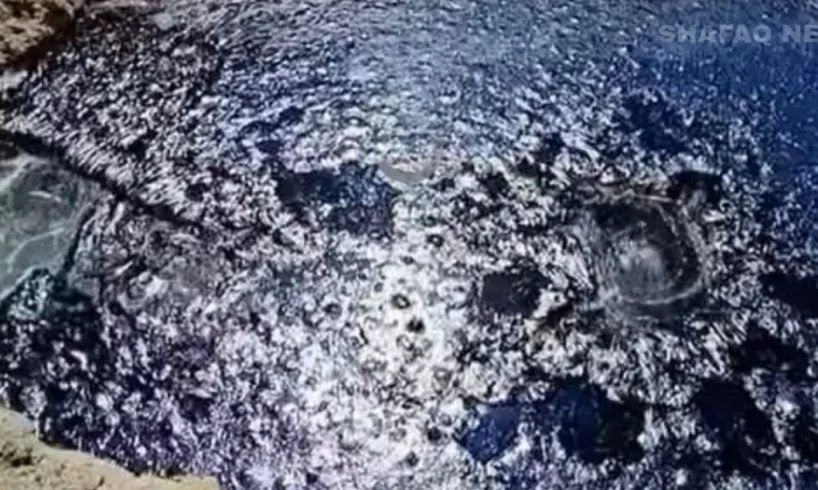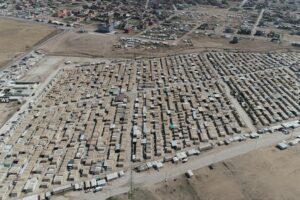
2025-10-17T22:42:07+00:00
font
Enable Reading Mode
A-
A
A+
Shafaq News
From the
banks of the Euphrates in the city of Hit, black, viscous springs have bubbled
for thousands of years — a rare natural phenomenon where earth, fire, and
history converge.
Known
locally as the “Tar Springs,” these vents continue to exhale smoke and heat,
preserving the memory of ancient civilizations that once thrived on this land.
A Geological
Marvel Beneath the Desert
Geologists
describe Hit as one of the world’s rare sites where oil, gas, and groundwater
intersect near the surface. “The tar emerges through rock fractures from deep
hydrocarbon reservoirs,” Geologist Akram al-Rawi told Shafaq News, noting that
the springs’ temperatures exceed 80°C and emit thick vapors at dawn.
Scientific
studies by Iraq’s Geological Survey confirm that the region contains natural
seeps enriched with hydrogen sulfide and trace radioactivity linked to
oil-bearing formations. Researchers believe the phenomenon dates back millions
of years, making it one of the oldest continuously active bitumen springs on
Earth.
The
Substance That Built Civilizations
Long before
modern drilling, the tar of Hit built empires. French chemical engineer Jacques
Connan traced the composition of ancient Mesopotamian bitumen to this region,
showing that its use in construction and ritual extended across Sumer, Akkad,
Babylon, and Assyria.
At the
Ziggurat of Ur — one of Mesopotamia’s oldest temples — bitumen from Hit was
used as waterproof mortar for baked bricks, and excavations revealed the same
material sealing royal tombs and mosaic inlays. Reed boats coated in tar once
sailed the Euphrates between Hit and Nippur, carrying goods and pilgrims.
Greek
historian Herodotus recorded the town of Is (ancient Hit) as the source of
asphalt used in building Babylon’s walls. Tablets even list “tar shipments from
the Euphrates region” among the empire’s state-regulated trades — alongside
salt and sulfur.
Historians
trace the modern name “Dhi Qar” (the Iraqi province) to the Akkadian phrase for
“the land of tar,” underscoring its role in the ancient economy. “Hit’s history
predates writing itself,” Historian Mahmoud Khalil al-Hiti told Shafaq. “It was
the heart of early trade routes, where natural wealth met human ingenuity.”
A Living
Flame Through the Ages
Local elder
Abdullah al-Hiti said the springs “have never stopped flowing — summer or
winter,” calling them a living emblem of the city. “Our ancestors used the tar
to seal homes and waterproof boats. It has protected our houses for
generations.”
Retired
teacher Hassan Zidan added that small amounts are still collected for repairs.
“The tar is part of our living heritage,” he told our agency. “Its story has
been handed down from father to son for centuries.”
Calls for
Protection and Recognition
Environmental
expert Ahmed Awad al-Issawi described the Hit tar springs as “a geological
treasure that deserves international heritage status,” warning that the
site “lacks any formal protection” and faces pollution from nearby activity.
Additionally,
studies published on Save the Tigris note that Iraq’s natural heritage sites —
including Hit — are endangered by neglect and urban encroachment. Al-Issawi
urged Iraq’s Ministries of Environment, Tourism, and Antiquities to designate
the site as a national geopark and develop it as an eco-tourism and educational
destination.
Local youth
groups have begun organizing volunteer heritage tours to revive awareness of
Hit’s history. “There’s a growing sense of pride,” historian Qassem al-Hamdani
explained. “If supported, Hit could become a showcase of Iraq’s geological and
cultural continuity.”
“Hit is
an open-air geological museum where fire, water, and oil meet,” geologist
al-Rawi stressed, calling for its formal registration as a national heritage
site.
For the
people of Hit, these ever-burning springs are more than a geological wonder —
they are witnesses to Iraq’s deep past. As locals often say, “Here, where fire
met water, civilization began — and the flame still tells the tale.”
Written and
edited by Shafaq News staff.





